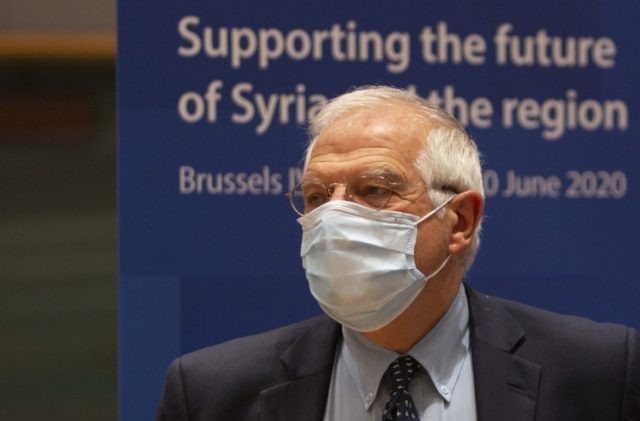Donors from around 60 countries and international agencies are meeting to drum up financial aid for Syria as the coronavirus and economic chaos wreak more havoc in the conflict-torn country
Syria donors gather as virus, economic chaos deepen crisisBy LORNE COOK and MIKE CORDERAssociated PressThe Associated PressBRUSSELS
BRUSSELS (AP) — Economic chaos, soaring food prices and the coronavirus pandemic are plunging Syria deeper into crisis as the country’s civil war grinds into its 10th year, European Union and United Nations officials said Tuesday at an online conference to raise funds to help Syrians who fled their homeland and those who are still there.
The war in Syria has killed more than 400,000 people and sparked a refugee exodus that has destabilized neighboring countries and impacted Europe. Around 11 million people are in need of humanitarian assistance, and some 9 million don’t have enough to eat. More than half of the population have no jobs.
“Humanitarian needs remain huge in Syria and around,” EU foreign policy chief Josep Borrell said as he announced that EU institutions would donate 2.3 billion euros ($2.6 billion) for this year and next.
International Federation of the Red Cross and Red Crescent societies President Francesco Rocca said the coronavirus has sparked “a multitude of new and complex challenges including the restriction of movement and goods, the delay of certain field activities, the closure of borders and a critical insufficiency of protective equipment for staff and volunteers.”
U.N. Resident Coordinator and Humanitarian Coordinator for Syria Imran Riza, speaking from Qamishli in northern Syria, told The Associated Press that the crises are taking a devastating toll.
“We are on the cusp of all these multiple crises,” Riza said. “You see kids that are clearly now getting malnourished. You are seeing levels of malnutrition that we have never seen in the last nine years and this gets worse and worse if you don’t take action right now.”
German Foreign Minister Heiko Maas pledged 1.584 billion euros ($1.8 billion) on Germany’s behalf as he, too, warned that the global pandemic was compounding the grim realities of life in war-shattered Syria.
“Access to humanitarian assistance is even further restricted,” he said during the virtual donor conference. “And health facilities that lie in ruins cannot attend to the enormous needs. Today, we can demonstrate that the world cares, that the people of Syria are not forgotten.”
Perhaps wary of the state of coronavirus-ravaged national coffers, the EU and the U.N. – joint chairs of the conference – underlined that they did not set a fixed pledging target. U.N. Under-Secretary-General for Humanitarian Affairs Mark Lowcock said about $10 billion is needed and that raising $5.5 billion “would not be a bad outcome.”
The EU has reported that in 2019 donors contributed 8.9 billion euros ($10 billion) in grants to Turkey, Egypt, Iraq, Jordan, Lebanon and Syria. The United Nations currently requires about $3.8 billion for its Syria-related work. Speakers at Tuesday’s fundraising meeting repeatedly expressed support for Syria’s neighbors housing refugees.
Lebanese Prime Minister Hassan Diab said the cost to his country of hosting more than 1 million Syrian refugees has exceeded $40 billion since the conflict began in March 2011 and he warned that the situation is getting worse amid an economic crisis.
Diab called on the U.N., the EU and friendly nations to “shield Lebanon from the negative repercussions” of sanctions, such as those imposed on Syria by the Trump administration in mid-June.
Tuesday’s virtual meeting is the eighth Syria pledging conference, and the fourth hosted by the EU, which estimates that it has donated around 20 billion euros ($23 billion) to Syria and the region over the years. Around 60 countries, key U.N. agencies and others involved in the conflict are expected to take part.
Beyond its economic impact, the coronavirus also forced the conference to be held online. The meetings are usually an important opportunity for officials to discuss thorny issues and resolve problems, but officials worry that the virtual format might reduce this years’ conference to a number-crunching exercise.
“I hope today we’ll raise as much money as we did last year because Syrians desperately need our aid and support,” Lowcock said.
____
Corder reported from The Hague, Netherlands. AP writers Sarah El Deeb and Bassem Mroue in Beirut contributed.

COMMENTS
Please let us know if you're having issues with commenting.